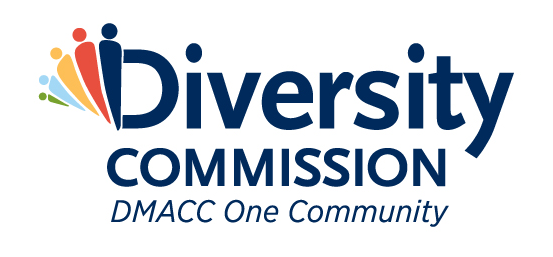Diversity Commission
Questions? Contact us.
DMACC Diversity & Inclusion
Diversity Commission
diversitycommission@dmacc.edu

DMACC's Diversity Commission
For speaker, swag, or funding requests for the Diversity Commission, please click here.
Mission: Diversity awareness is the full recognition and appreciation of human value. Des Moines Area Community College will actively advocate for diversity awareness and ensure the integration of diversity into all aspects of institutional life.
Vision: To create a culture in which all people are valued and supported, and to celebrate
the similarities and differences among us. In doing so, we will prepare the DMACC
community to live, to learn, and to work together in a global society.
Definition: DMACC's Diversity Commission defines diversity to include race, ethnicity, age, gender,
disability, religion, sexual orientation, and differences of thought, perspective,
and experience.
Goals:
- Engage students in an open, supportive, and responsive environment.
- Use teaching and learning styles and strategies to reflect diversity.
- Offer curriculum that reflects a multicultural as well as global society.
- Offer diversity education and development opportunities for the community.
- Plan activities and special events on our campuses that promote diversity.
- Actively recruit staff and students who represent a diverse world.
- Establish a district-wide communication system to share information about the function and activities of the Diversity Commission.
- Seek partners to advocate diversity in the DMACC region.
- Identify and implement best practices in diversity awareness.
Charter for Diversity Commission of
Des Moines Area Community College
Creation Date: February 6, 2007
Past Revision Date: March 27, 2012
Revision Date: May 4, 2021
Revision Date: July 19, 2022
Revision Date: November 7, 2022
I. Mission/Vision/Goals
- Engage students, staff, faculty, and administration in an open, supportive, and responsive environment.
- Provide resources for faculty to use to create curriculum that reflects a multicultural approach in the classroom.
- Offer diversity education and development opportunities for the DMACC community.
- Plan activities and special events on our campuses that promote diversity.
- Actively assist students who represent a diverse world through the Diversity Commission Student Scholarship Program.
- Partner with Human Resources and administration to actively recruit and hire people with diverse backgrounds
- Market and communicate the function, goals, and activities of the Diversity Commission district wide.
- Seek community partners to advocate diversity.
- Provide opportunities for historically minoritized students to successfully complete their education goals.
II. Structure
Chair or Co-Chairs
- Vice-chair(s) will be appointed or elected by the April Meeting and will serve as chair the following year; they will complete term if a Chair(s) is unable to act.
- The retiring chair(s) will serve as past-chair(s) either as a voting member of the Commission if their Commission term has not expired, or as a non-voting advisor if their Commission term has expired.
- If the vice chair(s) assumes the chair position, a new vice-chair(s) will be elected by the Commission.
- At the beginning of each academic year the Diversity Commission will review members status and send out a call to fill vacant positions.
- Campus positions-one from each campus and at least one center; recommended by a co-worker, approved by a supervisor, and approved by the commission. (minimum of 6 positions)
- District at-large positions- recommended by a co-worker, approved by a supervisor from any campus or offices that serve the entire college; approved by the commission. (minimum 9 positions, three of which could be students)
- Non-voting, ex-officio, positions - non-voting positions appointed by department supervisors in the following areas: Student Activities Council, Marketing, and Library. The Director and Assistant Director from the Diversity and Inclusion office and our Diversity Commission Administrative assistant will also serve as a non-voting, Ex-Officio members.
- New members will be on a 3-month probationary period prior to being approved by the commission. Newly elected members’ terms will be retroactive based on their probationary start date.
- Commissioners will serve three-year terms. Terms run from June 1st through May 31st.
- An additional year may be added for Chair(s)/Vice-Chair(s) if necessary, to complete term of the position.
- Previous Chair(s) will remain on the Commission one year after their term ends as Chair. This will be a non-voting position unless this year completed their 3rd year of a 3-year term. Retiring members will remain off the Commission for one year before being able to join again.
- When members are due to retire, a call for new members will be sent to the campus, center, or department. If no one responds to that call, the original member may serve two consecutive terms before retiring if approved by the majority of the Commission.
III. Leadership
Committees will be created and maintained at the discretion of the Commission. A member of the Commission will serve as the committee chair for each of the areas of emphasis. At the end of the semester, each area of emphasis will submit a short report about the goals they set for the semester and what was accomplished.
Ad Hoc Tapestry Award CommitteeThe Commission will send out a district-wide call for nominations for the Tapestry Award each year. The Commission will have the option to nominate one person for the award each year. The Awards will be presented at DMACC’sspring In-Service day.Ad Hoc Teacher Toolkit CommitteeThe Commission will provide diversity and inclusion resources, suggestions and opportunities for faculty and staff members to assist them in integrating these topics into their curriculum and/or committees.
IV. Meetings
V. Authority
The Diversity Commission will recommend DMACC policies and procedures as they relate to Diversity and Inclusion to the Director of Diversity and Inclusion, who will then take the recommendation to the President's Cabinet. If the recommendation is approved by the Cabinet, the Cabinet will direct appropriate individuals, offices, or departments to carry out the decisions.
VI. Accountability
The Diversity Commission will keep a record of activities, trainings and other events which can be made available to the President of DMACC upon request.
VII. Budget
The Commission will use funds designated to them by the Board as discretionary funds to be used for speakers, scholarships, training, marketing materials, conferences, institution building, and other expenses deemed necessary by the Commission which contribute to the achievement of the goals and mission.
VIII. Changes to Charter
Changes to the charter of the Diversity Commission must be done by two consecutive votes in which 2/3 of the sitting Commission approve the changes. The first vote must occur at a commission meeting with the second approval occurring either electronically or at the following meeting.
Co-Chairs: Aimee Langager (2023) and Mark Bates (2023)
Past Chair: Jennie Doke-Kerns (2022) and Bruce Lasch (2022)
Co-Vice Chairs: TBD
Treasurer: Jim Bunton (2023) (Adjunct Faculty)
Members
(Appointed Year following their name)
Ankeny
- Jim Bunton (2023) (Adjunct Faculty)
- Susan Cruz-Rodriguez (2023)
- Rebecca Funke (2023)
- Behzad Jeddi (2024)
- Jackie Kollasch (2024)
- Amanda Magie (2022)
- Chelsea Miller (Commission Administrative Assistant) (2023)
- Karey Palmer (2023)
- Kenya Pruitt (2022)
- Erin Rinderknecht (2024)
- Erin Smith (2011)
- Lucy Stam (2023) (Adjunct Faculty)
- Jason Surratt (2023) (Adjunct Faculty)
- Janelle Thorton (2022)
Boone
- Bruce Lasch (2022)
- Peter Kosegei (2024)
Capitol
- Tamara Fulton (2024)
Newton
- Jennie Doke-Kerns (2022)
- Sveta Miller (2022)
Perry
- Connie Oliver-Saenz (2023)
Southridge
- Mark Bates (2023)
Urban
- Aimee Langager (2023)
- Becca Papian (2022)
- Natalie Valpey (2024)
District Wide
- Wesley Harris Jr. (2023)
Procedure for Adding a Course to the Diversity Requirement Course List
- A course can be initiated for consideration in either of two ways: (a) A faculty member
may submit a proposal to the chair of the Diversity Commission Curriculum Committee
or any of its members (who would then pass the proposal to the chair), or (b) the
Scheduling Coordinator may recommend to the DCCC that a course should be considered.
- Beginning in Fall 2022, for courses to be included on the Diversity Requirement Course List, they must have at least one different sub-competency or main competency that explicitly mentions diversity or a closely related, discipline-specific term for each credit hour that makes up the course. To be counted towards this requirement, sub-competencies must fall under different main course competencies and/or the main course competencies that mention diversity must be different. (For example, a 3-credit course would need to have a total of three sub-competencies or main competencies mentioning diversity in 3 different main competencies for the course.) The purpose of this requirement is to ensure that courses that meet the Diversity Requirement have diversity built into the structure of the entire class, rather than merely a subsection or unit.
- Consideration of the proposed courses may be done in a face-to-face meeting of the
DCCC, or the submitted materials may be distributed by the chair or designated committee
member electronically to the DCCC members with an electronic vote separate for each
course being considered. The decision will be determined by a majority of the committee
members voting with a quorum of one more than half the committee required.
- The recommendation of courses by the DCCC would then be presented by the DCCC chair
to the Diversity Commission members for final approval. The course descriptions and
rationales should accompany the recommendation. The decision will be determined by
a majority of the Commission members voting with a quorum of nine members required.
- The result of the vote by the Diversity Commission must be reported by the DCCC chair
to the Scheduling Coordinator who would ensure that the approved courses would be
added to the list in the next fall catalog.
- The faculty who proposed the courses, the DCCC members, and the Diversity Commission
members should be informed of the decision of the Diversity Commission by the DCCC
chair.
- Please contact the Diversity Commission directly with questions about the process for requesting that courses be designated as meeting the Diversity Requirement.
